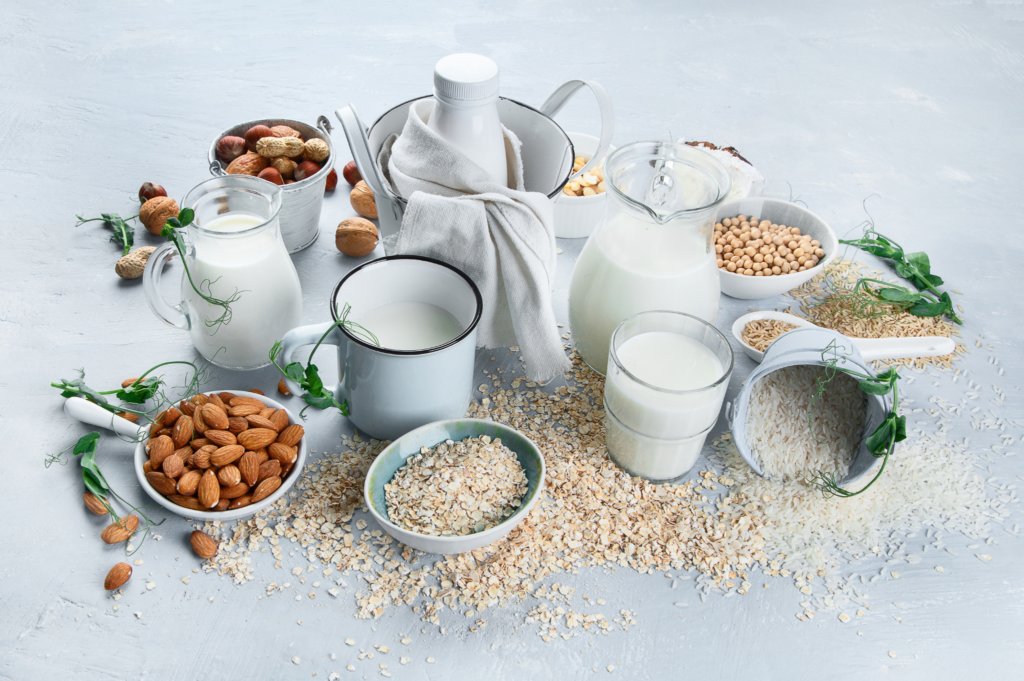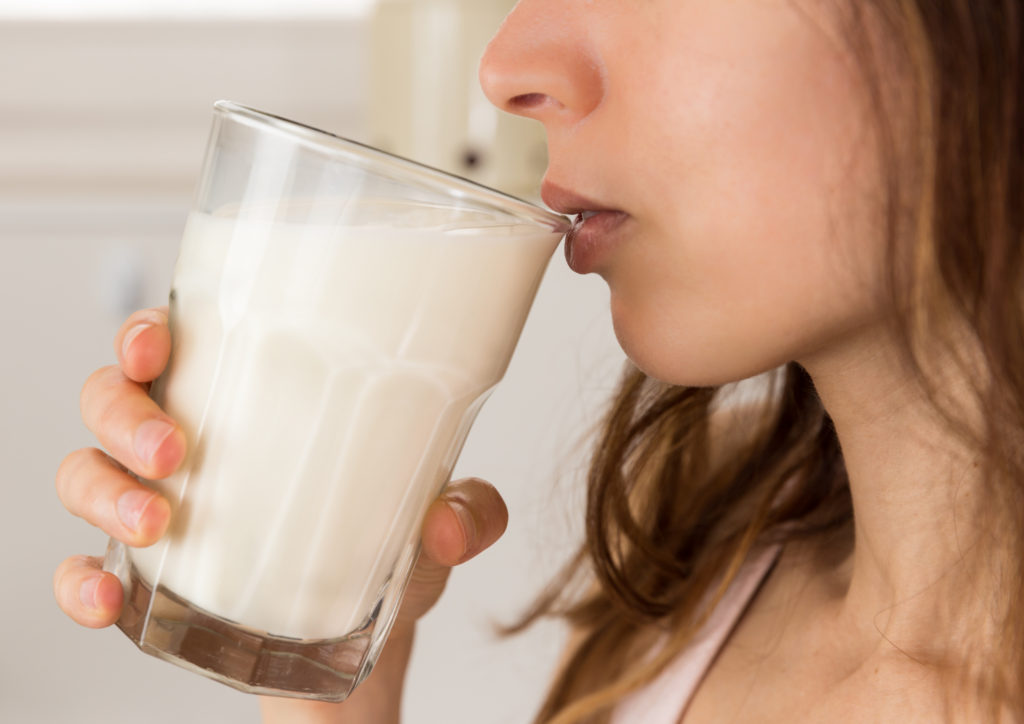Beyond the Headlines: Does Plant-Based Milk Really Cause Depression?
7 Mins Read
An observational study exploring the link between depression and different types of milk is being used to spread misinformation about plant-based milk.
A new study about milk drinking is doing the rounds, with plant-based alternatives bearing the brunt of the headlines – but they were barely mentioned in the findings.
You’ll be miserable if you drink oat milk. Or so they’re saying online.
“Experts issue warning over oat milk – dairy alternative linked to health harm while semi-skimmed cow’s milk boasts surprising benefit,” read a Daily Mail headline.
“Boost for dairy as scientists link plant-based milk with mental health issues,” wrote trade publication Farmers Guardian.
The Times, meanwhile, went a step further: “Vegans are more likely to be depressed, study suggests.” Even popular magazines like Women’sHealth got in on the action, writing: “New research says drinking plant-based milk ‘increases risk of depression'”.
They all reference a new paper in the Frontiers journal by researchers from the Southern Medical University in China, who analysed the data of over 350,000 people enrolled in a UK Biobank study. Between 2006 and 2010, the participants were asked about their lifestyle, health, and consumption habits – including milk intake – with their mental health being assessed through questionnaires a decade later.
Clickbait headlines are misinformed
If you believe the headlines and the majority of the coverage, here’s what the study found: semi-skimmed milk lowers the chances of depression by 12%, full-fat milk reduces anxiety risk by 16%, and plant-based milk raises the likelihood of depression by 14%, compared to people who don’t drink milk.
That seems scary if you drink non-dairy milk. In a media landscape beset by misinformation, headlines vilifying plant-based products are clickbait-worthy so it’s no surprise that publications jumped on this, painting the entire category with the same brush and declaring that cow’s milk is king and vegan food is bad for your mental health.
The problem is, this isn’t really what the study concluded – and even then, there were some massive gaps in the research, some of which the authors acknowledged themselves.
“These findings are in no way compelling evidence for the bizarre claim that drinking plant-based milk causes depression,” said Amy Williams, nutrition lead at alternative protein think tank the Good Food Institute (GFI) Europe. Here’s why.
Study classification of ‘other milks’ unclear

In the study, the researchers asked participants what type of milk they mainly drank at the start of the study, and what mental health conditions they experienced over the next decade. This wasn’t a controlled trial, but an observational study, and it’s impossible to know whether people exclusively drink a single form of milk.
Most of the participants consumed semi-skimmed milk (65%), while others drank skimmed milk (20%), whole milk (6.5%), and what the researchers termed “other types of milk” (5%). The latter category included soy milk – the only mention of any plant-based milk throughout the study – but it was unclear what else.
“The headlines focus on the findings of this ‘other’ category, on the assumption that it is entirely made up of plant-based milk drinkers, but this assumption was not made in the paper itself,” Williams pointed out.
“All we know is that the ‘other’ group is made up of soy milk drinkers alongside everyone who selected ‘other’, which may include different kinds of animal milk such as lactose-free or sheep milk.”
The researchers also did not measure the quantity of milk consumed, which makes it hard to draw conclusions about any single type of dairy-free milk.
The problem with observational studies

Observational studies don’t demonstrate causation, so to remove some of the uncertainties, the researchers performed a Mendelian Randomisation (MR) analysis, which uses genetic differences to examine the causal effects of an outcome.
But the MR assessment was only performed on semi-skimmed milk, finding a 17% drop in depression risk – this is likely due to the presence of calcium and vitamin D. However, the “other types of milk” used were not fully disclosed, and it’s not known whether the plant milks included were fortified or not. Most such products today are fortified with both calcium and vitamin D too, and they would likely offer similar mental health benefits, based on the scientists’ hypothesis.
Moreover, none of the other forms of dairy and non-dairy options were given the MR treatment. So the rest of the study’s findings were based on correlation, not causation, using self-reported dietary data. They were also “influenced by the extensive duration of the follow-up”, the author said, noting that the results “must be interpreted cautiously”.
Observational studies should “always be taken with a pinch of salt”, according to GFI Europe’s Williams. “They are useful to identify possible directions for further study, but not for drawing firm conclusions about causality,” she told Green Queen.
“To give a simple example, an observational study may find a correlation between people getting sunburnt and eating ice cream. It’s clear that both of these are caused by some other factor – both things happen on sunny days – but to test this, we need different kinds of study.
“Confusing correlation with causation in observational studies is a common problem in health reporting, but is fairly standard – but these headlines have taken this issue one step further.”
I drink plant-based milk – should I be worried?

Williams noted that the study is based on questionnaires taken between 2006 and 2010, when plant-based milk had a fraction of the drinkers it does today. In the UK, 35% of households purchased non-dairy milk in 2023, and today’s market contains a much wider range of options with better nutritional value than they did two decades ago.
“What’s very curious is that a study which doesn’t even talk about plant-based milk beyond one passing mention and which doesn’t appear to have been press released by its authors managed to generate such widespread and misleading media attention,” said Williams.
Bila Chniouer, a UK-based registered associate nutritionist, told Green Queen: “Some media reports suggest certain plant-based milks, such as soy, may be linked to depression. However, the study did not specifically investigate the impact of the consumption of specific types of plant-based milk on depression, nor did it determine whether participants were vegan, vegetarian, or simply preferred non-dairy options. This could substantially influence the findings.”
It’s worth noting that the study included mostly middle-aged to older adults of European descent – so the impact on younger populations was not covered.
Should they be worried about consuming vegan milk alternatives, especially soy? “No,” said Chniouer. “In fact, we know that soy consumption is associated with a lower risk of depression.”
She explained that soy contains isoflavones – plant-based compounds that mimic the action of oestrogen by binding to oestrogen receptors in the brain – and they help regulate serotonin production in the brain, while having anti-inflammatory and antioxidative effects on the body.
“The study grouped all plant-based milks (such as soy, oat, and almond) into a single, broad category. As a result, it is unclear whether any specific type of plant-based milk has a definite impact on depression,” she added. “Therefore, additional research is needed to thoroughly evaluate the effects of each type of plant-based milk on depression.”
Veganuary timing a coincidence?

The Frontiers study has been circulating everywhere at the same time as another large UK analysis that linked greater calcium consumption to a decreased bowel cancer risk.
The amount of calcium (300mg) that’s important can be found in foods like dark leafy greens, bread, and tofu – but the way it’s framed in the media, all you’ll need is a glass of milk, despite the authors specifying that this intake can also come from non-dairy foods, like plant-based milks.
This is not the first time that studies have been reported on in a misleading manner to unfairly demonise vegan food – and it will likely not be the last.
But they’re in the media during Veganuary, whose 2025 campaign is predicted to be its largest yet. Whether it’s just happenstance that this coincides with a drive to increase meat and milk consumption – backed by the UK government and slammed by medical professionals – can’t be determined for certain.
However, some stories about the Frontiers study do mention the AHDB’s Let’s Eat Balanced campaign for January, and that has raised questions about the influence of the dairy lobby in media coverage around plant-based food.



